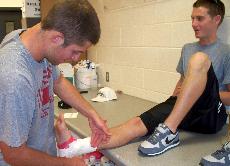Athletic trainers gain know-how

September 30, 2009
There is a steady flow of athletes from 2 p.m. to 6 p.m. who all need help or treatments done. Along with doing treatments, ice bags need to be filled up, water needs to be given out and the medical kits need to be stocked. It can seem quite overwhelming at times, but well worth it say Simpson College’s student athletic trainers. Jesse Reis, Katie Luzum and Adam Reutzel, along with many others, do athletic training for football and other sports.
Fifth-year senior Jesse Reis played baseball his first four years as a Simpson student. Along with football, he will be athletic training for baseball. From being around sports his whole life, he figured that athletic training would be a good way to stick with it.
The job has its stresses, however.
“You have to take it one step at a time,” Reis said. “You want to treat everybody, but it’s impossible.”
Although it can be overwhelming sometimes, the certified trainers are personable and easy going.
“You create a friendship with your professors, but with these guys it’s different,” Reis said. “I feel like I’ve known them for a long time, when really I’ve only known them for four years.”
This past summer, Reis worked for the Iowa Cubs. He did treatments for the team similar to those he does at Simpson. It was an awesome experience, according to Reis, but if he could be a personal trainer for any team, he would choose the Atlanta Braves.
Senior Katie Luzum, along with athletic training for football, will be an athletic trainer for wrestling. She did cross country and track for three years at Simpson and decided she wanted to be an athletic trainer with the help from a professional athletic trainer in high school who helped her when she injured herself.
Watching people have to sit out can be disappointing, but Luzum hopes to one day help those who have to at the University of Iowa or the University of Southern California. While knowing how to help those in need is important, having time management skills and knowing when to say no is also important.
“There are a lot of late nights,” Luzum said. “And you have to know how to prioritize.”
Having both parents in the medical field and loving sports are what influenced fifth-year senior Adam Reutzel to become an athletic trainer. Reutzel played football for Simpson for four years and enjoys being an athletic trainer for them now.
“You get really into it,” Reutzel said. “Kind of like if you were playing. Coming from football then training for it, I still get to be a part of the team.”
Just as with all the other majors, there’s a long list of required classes that come along with being an athletic trainer.
“The classes were difficult if you made them difficult,” Reutzel said. “You have to be willing to learn.”
One thing that makes the classes easier is that by being an athletic trainer, you get to work with what you are learning about.
“It goes hand-in-hand with what we’re learning,” Reutzel said. “You deal with it firsthand. It’s a more hands-on experience.”
Along with dealing with it firsthand, the professional athletic trainers at Simpson have the athletes go to the student athletic trainers first.
Reutzel hopes one day to be an athletic trainer for the Chicago Bears.
Athletic trainers sometimes get paid little. It can be time consuming and can get stressful, but getting to know so many athletes, seeing them progress, and then watching them return to their sport makes it worth while say Reis, Luzum and Reutzel.
Those three, along with many other athletic trainers at Simpson, say they have worked hard to be where they are today, and they hope that hard work will lead them on the road to successful athletic training jobs.











